Parenting styles refer to a parent’s attitudes and behaviors toward their children and how emotions are expressed through these behaviors.
When it comes to parenting, many different factors and backgrounds contribute to how parents raise their children. Everyone takes parenting approaches and practices in unique ways, and how they parent can significantly impact their child’s temperament, life, and future.
Parenting practices can be looked at in many different ways, but generally, there are 4 main different types of parenting styles: authoritarian, authoritative, permissive, and neglectful or uninvolved parenting.
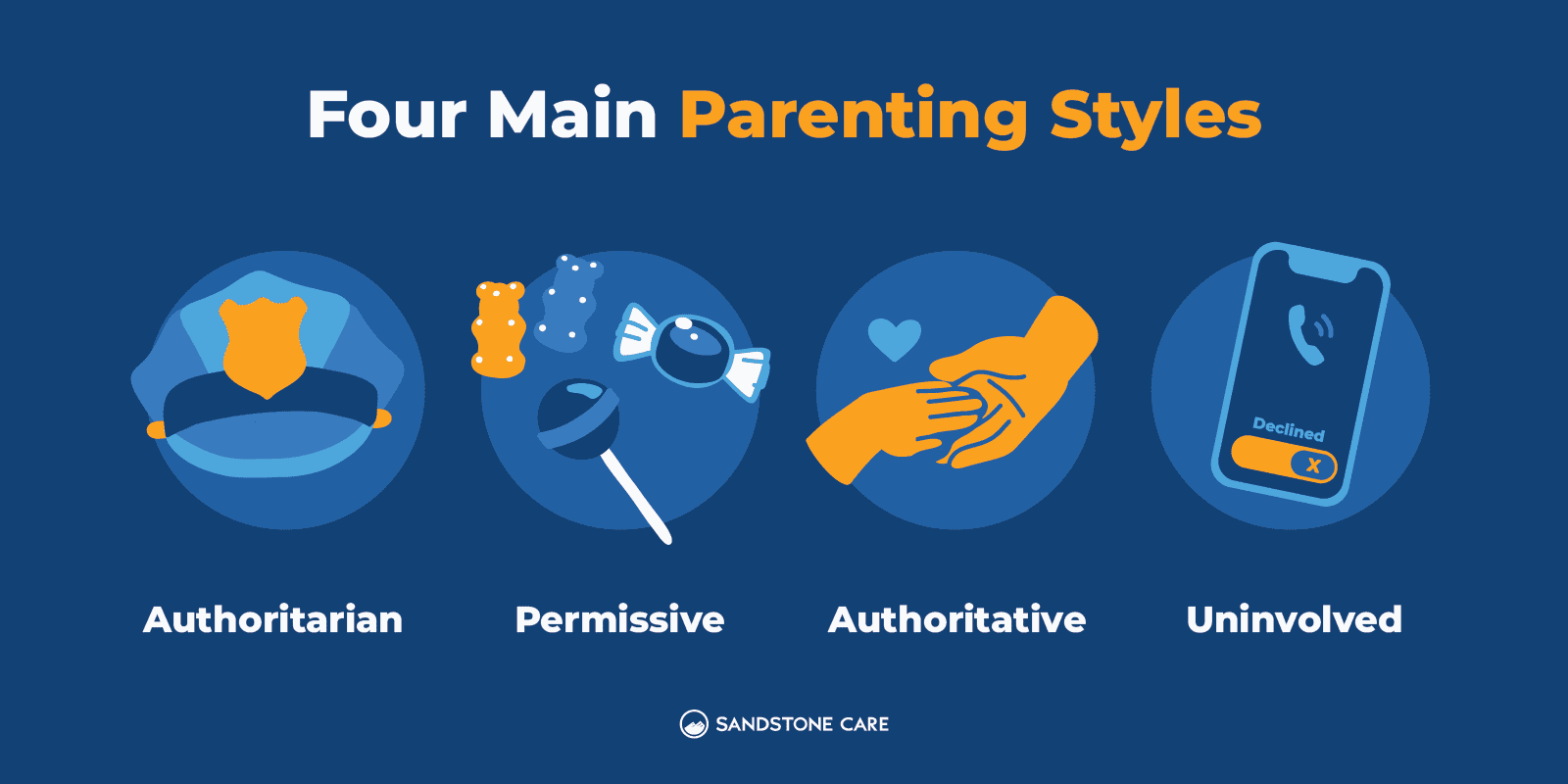
There are so many factors that can influence a person’s parenting style. This can include their age, gender, personality, beliefs, history, and culture.
A European family will likely parent very differently than an American family. Parenting styles also range widely, even within tight-knit communities.
Parenting styles are important because they influence every child’s life.
It may feel easy to assume that children don’t remember very much and that they are not affected drastically by the choices of their parents. But even though children can be resilient, parenting styles can seriously affect their growth and development.
The authoritative parenting style is considered to be the most effective. authoritative parenting has been consistently associated with positive effects on youth, including maturation, resilience, self-reliance, and self-esteem.
The developmental psychologists at the Journal of Child and Family Studies have found that authoritative parenting helps children to grow up with a stronger sense of self, and confidence, and was correlated with higher academic achievement.
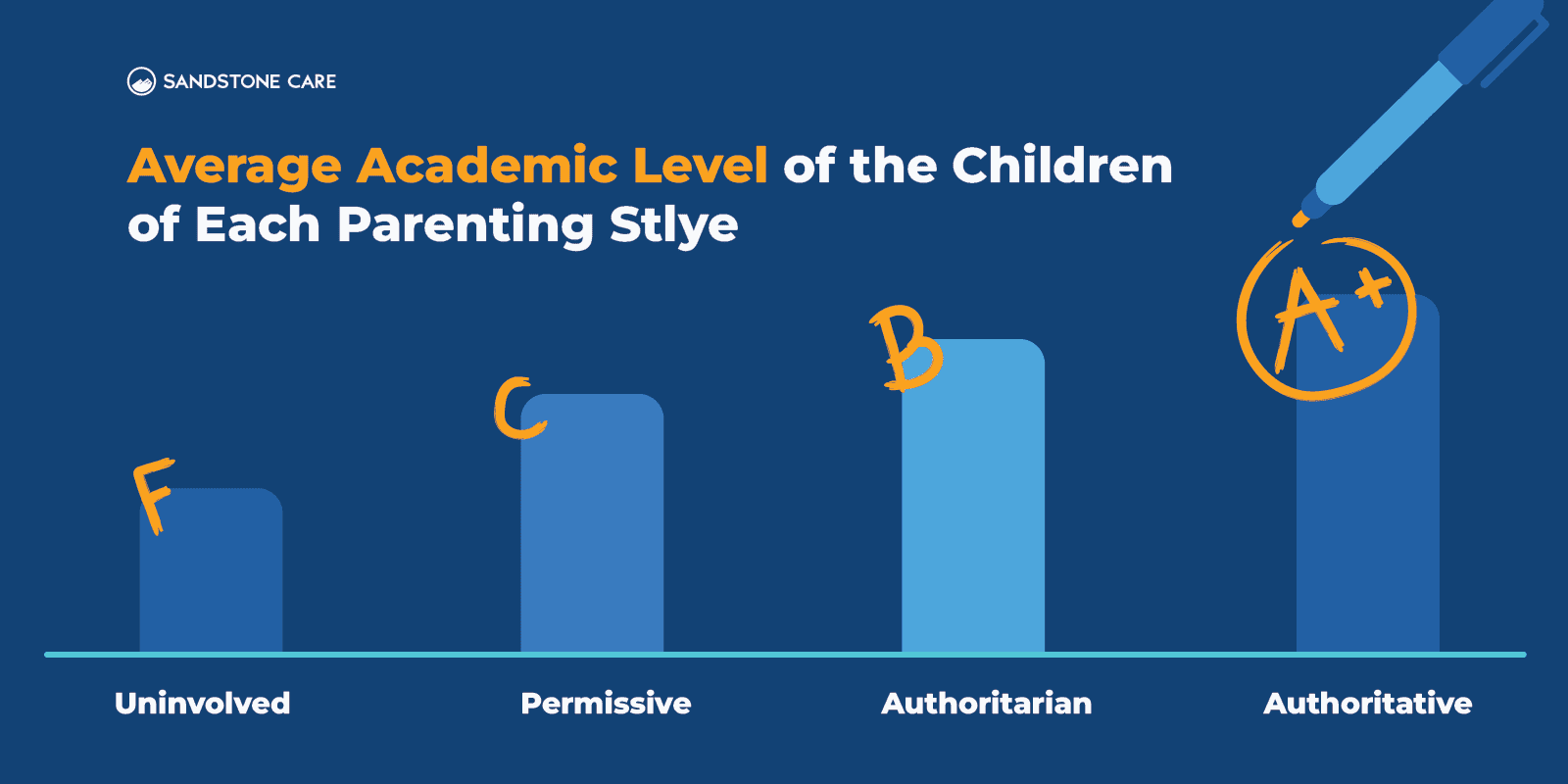
The four main parenting styles are authoritative, authoritarian, permissive, and neglectful.
The term “gentle parenting” has also emerged in recent years that is a type of authoritative parenting.
Authoritative parenting is considered the best, evidence-based parenting style.
Research shows that authoritative parenting correlates with positive effects on children and youth, including healthy growth and development, physically, mentally, and personally.
Many parents don’t necessarily fall under one single parenting method; they take a mixed approach of different methods.
However, authoritative parenting is generally the most common parenting style.
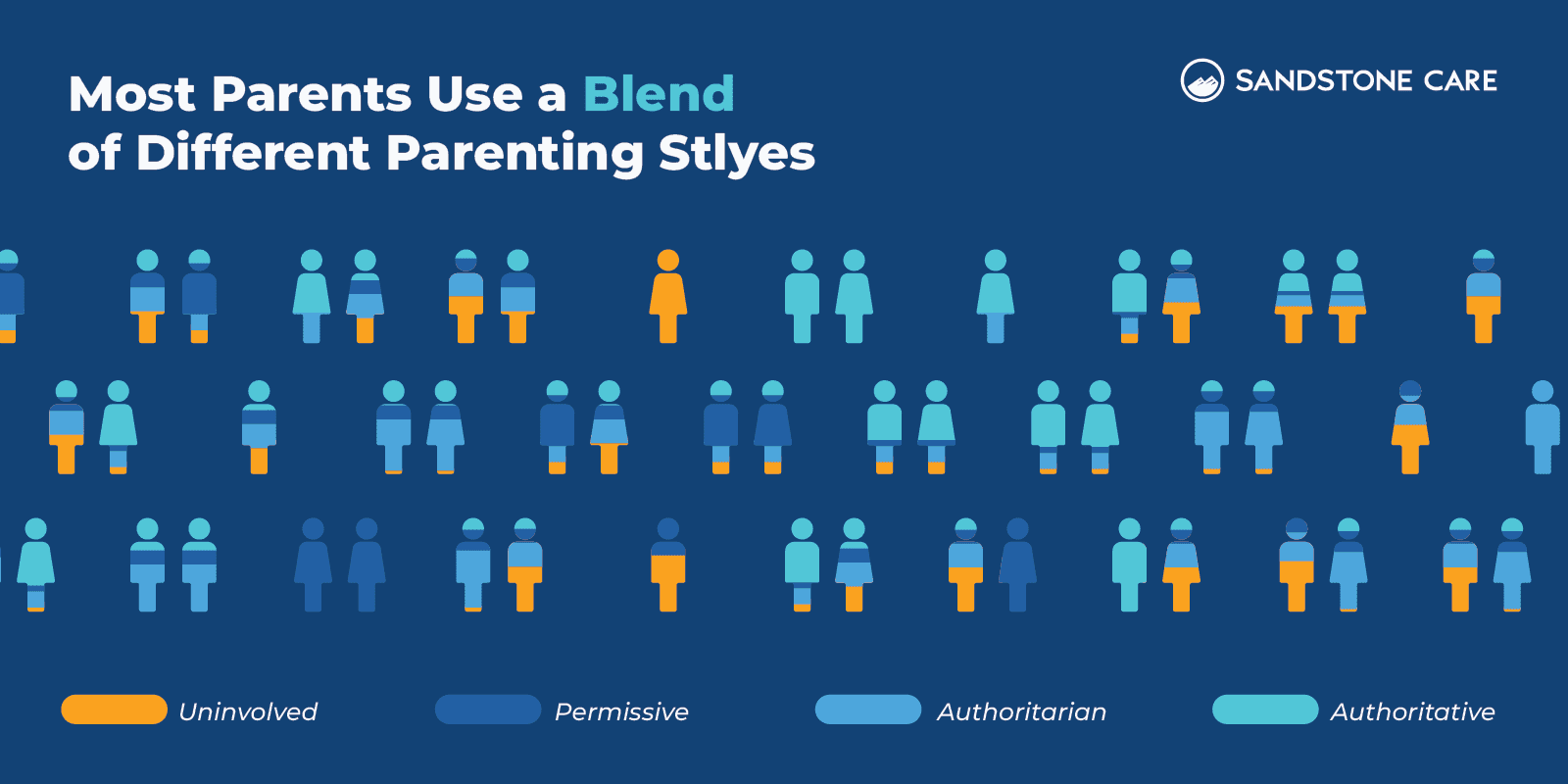
Authoritative parenting is seen as the parenting style that best promotes healthy growth and development.
However, the way that authoritative parenting appears in a family is never the same way twice. It’s essential to take into account your child’s specific needs, talents, and areas where they might benefit from higher levels of guidance.
Both authoritarian parenting and neglectful parenting are associated with lower-quality parent-child relationships. Neglectful parenting and authoritarian, or tiger parenting, also result in the worst developmental outcomes, according to The International Journal of Environmental Research and Public Health.
Authoritarian parenting is the most strict parenting style.
Authoritarian parents place high expectations on children and offer little responsiveness. With authoritarian parents, the focus is on obedience and parental control rather than comfort and nurturing.
Helicopter parenting is an overprotective and highly involved parenting style.
While being involved in your child’s life can be great, helicopter parents hover over everything their child does. Attachment parenting tends to make parents more controlling and anxious, impacting their children’s independence and development.
Authoritative parents have a close and nurturing relationship with their children.
As described by the American Psychological Association, authoritative parents are responsive to their children’s needs and supportive, and they also have clear and firm limits for their children.
Authoritative parenting is like finding the right balance between being a loving parent and a firm guide. These parents are warm and caring, but they also set clear rules and consequences. They encourage their kids to talk openly, expect them to do well, and help them learn to make good decisions.
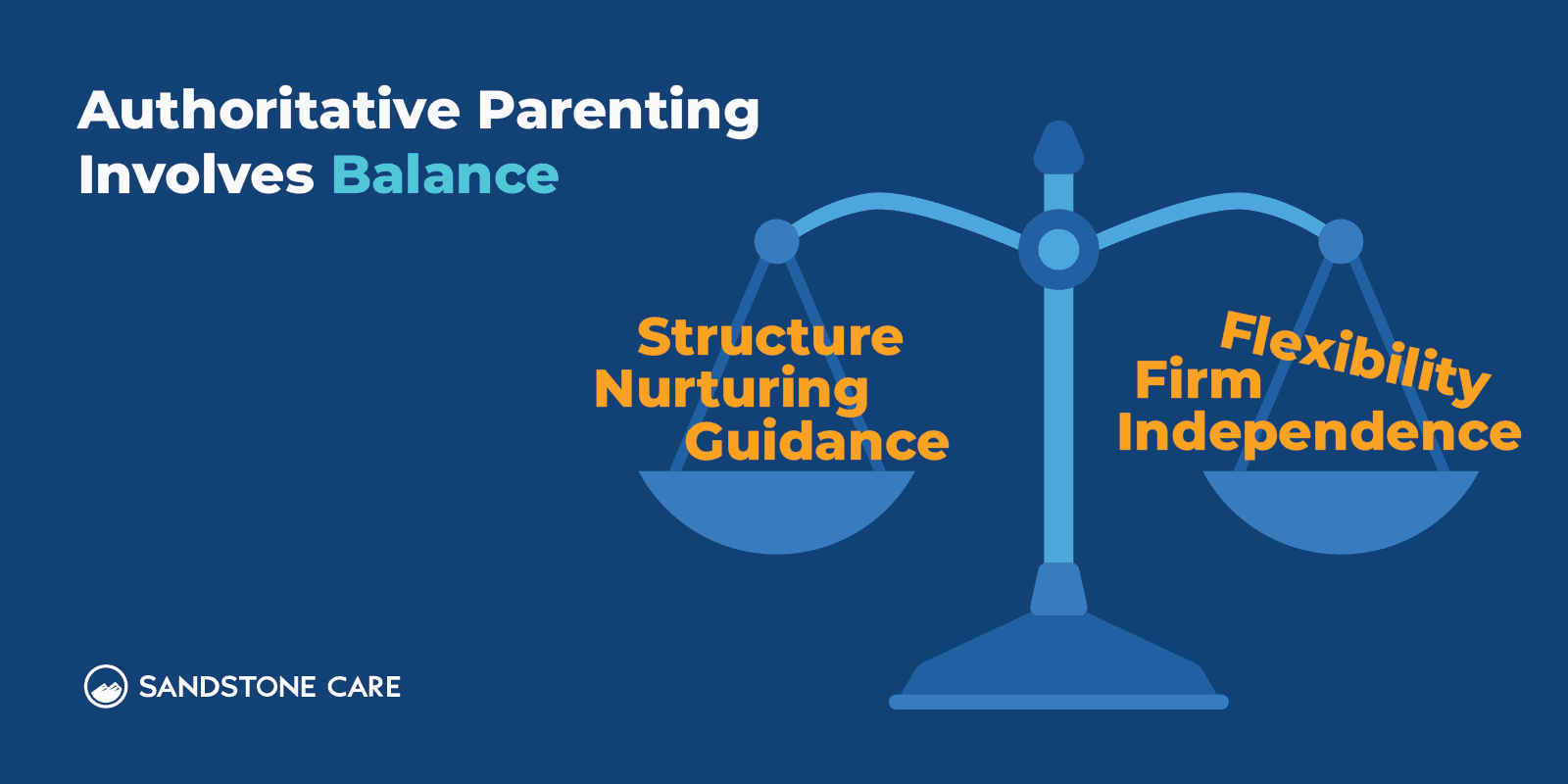
For instance, let’s say a parent faces a challenge when their child, Alex, is not doing well in school. An authoritative parent would sit down with Alex, listen to their concerns, and then set clear expectations for improving grades. They might offer help with homework and check in regularly to see how things are going. Instead of punishing Alex for poor grades, they’d focus on teaching responsibility and hard work.
In this way, authoritative parenting helps children grow up with strong values, a good work ethic, and the ability to handle life’s ups and downs. This approach often leads to children who excel in school and have a strong sense of emotional well-being.
Another word sometimes used for authoritative parenting is “democratic” parenting. The idea is that the parent has high expectations for their children but also provides support and guidance.
Sometimes authoritative parenting is also referred to as “gentle parenting.”
Common characteristics of an authoritative parent can include:
Certainly, here’s a clearer list of characteristics associated with authoritative parenting. Authoritative parents are:
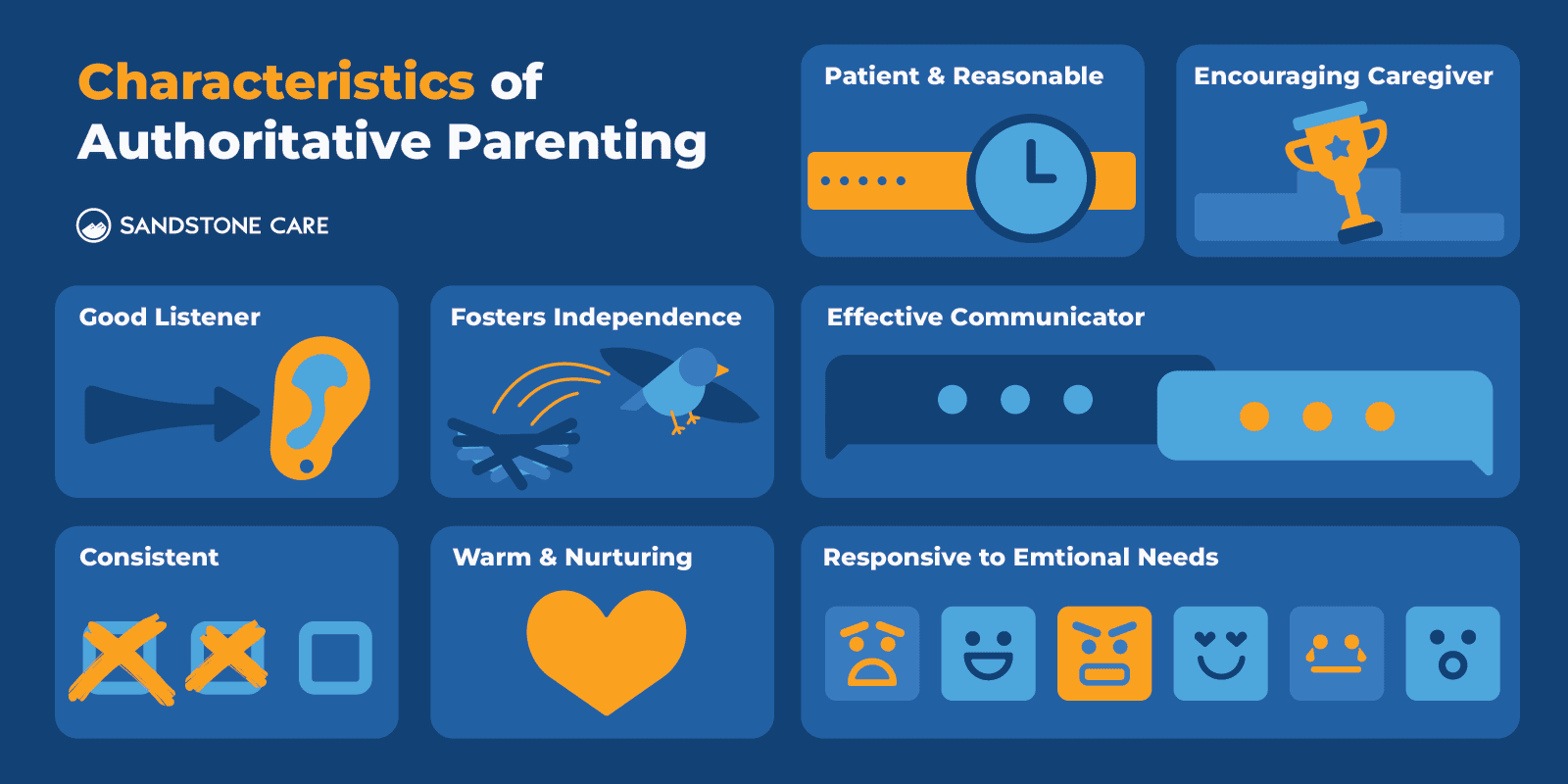
Authoritative parenting often results in children who grow to have confidence and high self-esteem, are responsible, and have the ability to self-regulate.
With the ability to self-regulate, children of authoritative parents are better able to manage their emotions, which promotes better social and mental health. They tend to have a healthy level of self-confidence as well.
Authoritative parenting also encourages independence, which is important in their development and growth.
The authoritative parenting style is considered the best because it fosters a healthy relationship between the parent and child, one with respect, boundaries, communication, and love.
This strong foundation often leads to enduring, positive relationships between parents and their adult children.
While authoritative parenting encourages independence, sometimes children or teens may see their parents’ limits or expectations as restrictive, especially when they compare their situations with those of their peers who may have permissive parents.
Sometimes, authoritative parenting also depends heavily on rules and procedures, which can pose challenges when faced with a situation without rules or that deviates from their procedures.
Additionally, authoritative parenting can take a lot of communication and patience, which can take time and energy. But ultimately, it often ends up with benefits for all.
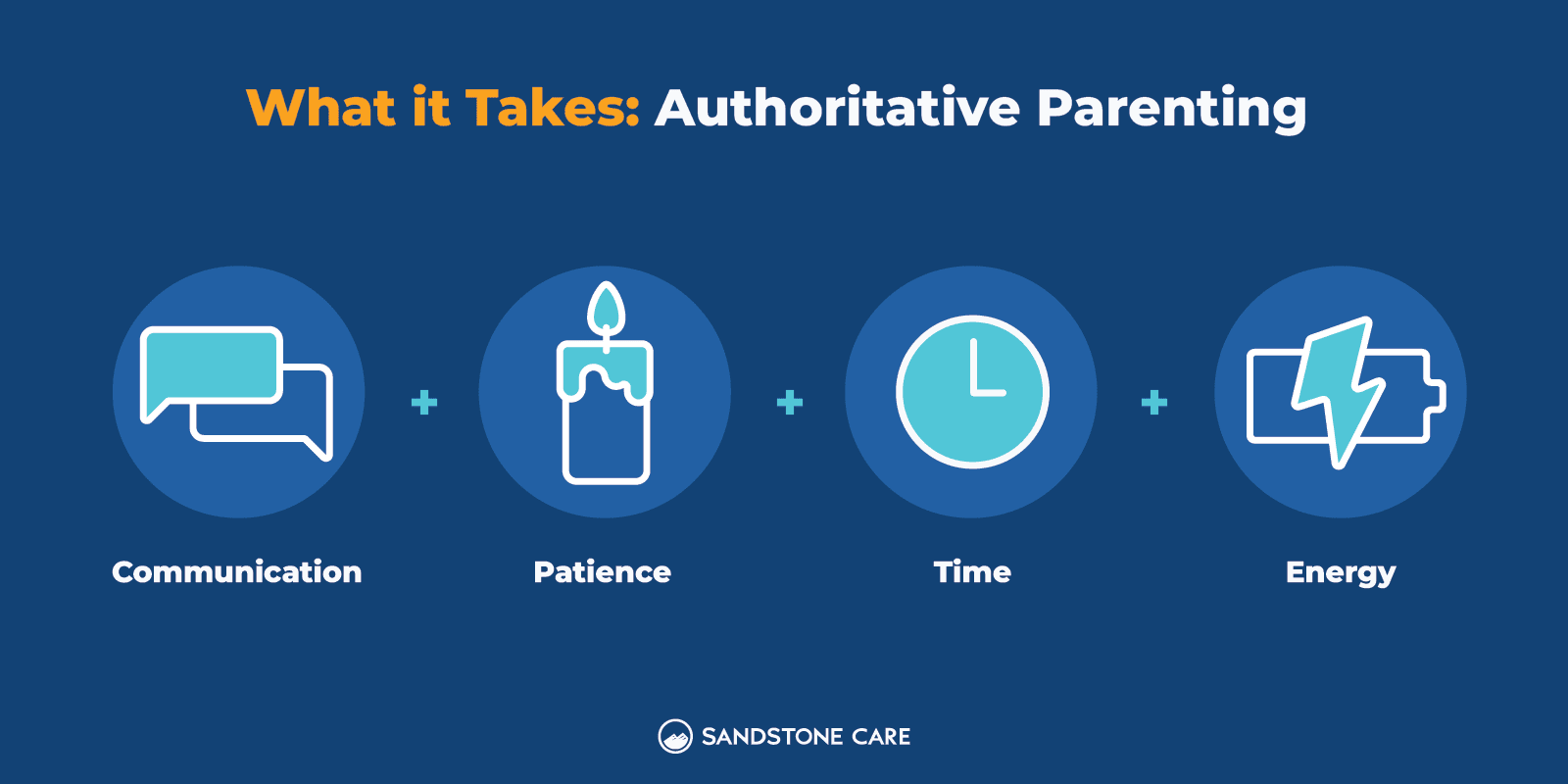
Authoritarian parenting is considered a strict form of parenting that involves strict rules that the child is expected to obey.
Authoritarian parenting means expecting your kids to follow rules without much room for discussion or negotiation. It does share the aspect of high expectations with authoritative parenting, but here’s where it differs: it’s not big on being responsive or explaining why these rules are in place.
In an authoritarian household, you’ll find parents laying down the law, and when kids slip up, it’s not about calmly discussing the issue – it’s about punishment. The consequences can be pretty tough, like time-outs, losing privileges, or sometimes even physical punishment. The goal here is to make sure kids obey, often through a fear of what might happen if they don’t.
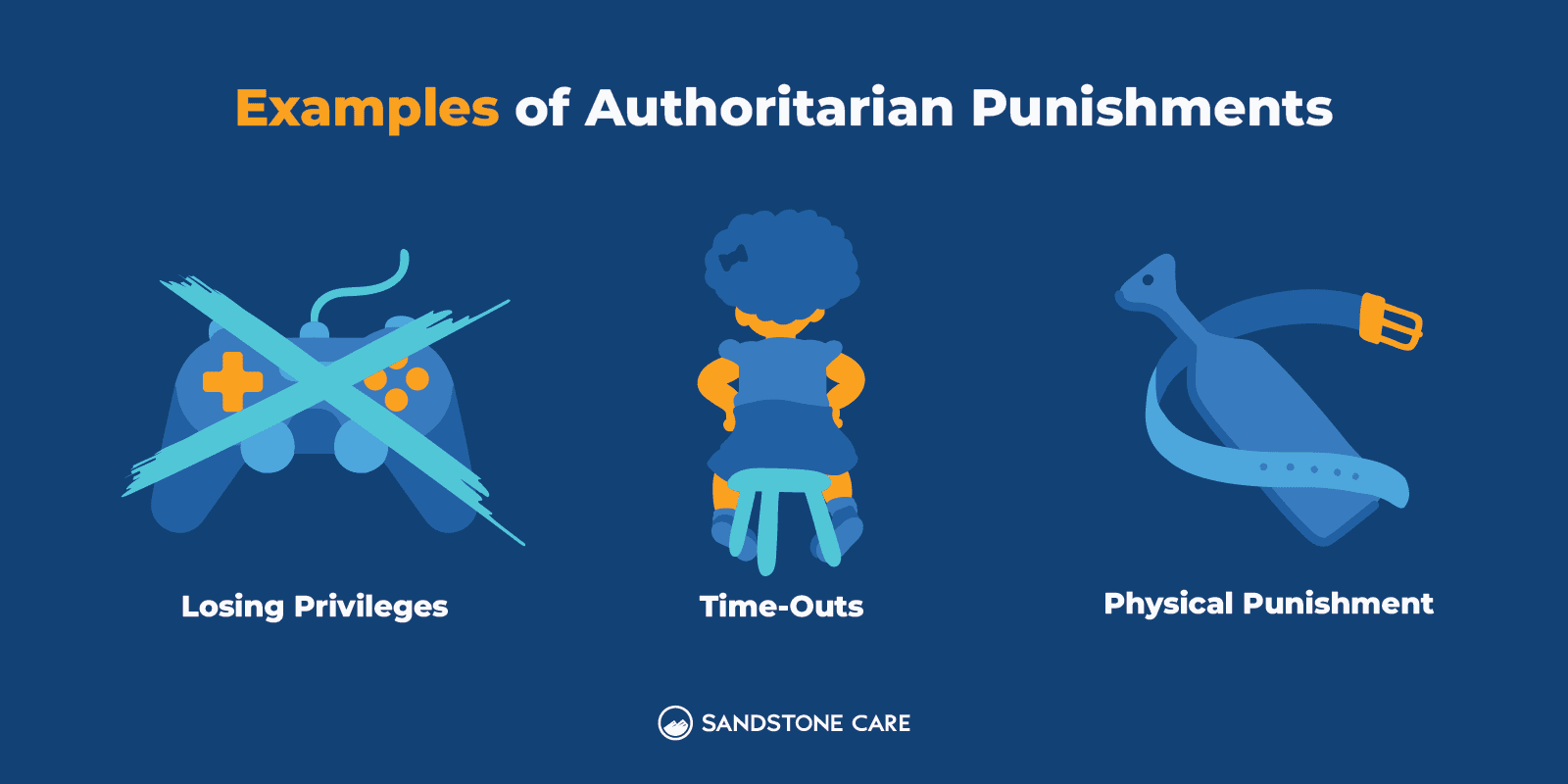
What’s more, in authoritarian parenting, there’s not a lot of room for kids to express themselves. The parent’s authority is non-negotiable, and kids might feel like they have to go along with it to avoid getting into trouble. This lack of open communication can make it challenging for kids to develop important life skills and feel comfortable expressing their thoughts and feelings.
Now, while authoritarian parenting can make kids follow the rules in the short term, it can have some long-term effects. Kids raised this way might struggle with expressing themselves, making choices, and forming healthy relationships as they grow up. Sometimes, they can carry feelings of fear or resentment related to authority figures into their adult lives.
In a nutshell, authoritarian parenting means strict rules, less talking it out, and more punishment. While it may keep the peace at home for a while, it can pose challenges for a child’s emotional and social growth, affecting their relationships and overall well-being later in life.
Some of the most common characteristics of authoritarian parenting include:
Children with authoritarian parents can be well-behaved, often because they fear the consequences of misbehaving.
On the other hand, children with authoritarian parents can become aggressive because they aren’t provided much support or guidance in regulating their emotions. They may also be shy or unable to make decisions due to low self-esteem or hindered independence.
Additionally, children with authoritarian parents may be compelled to rebel to combat strict rules and punishments as they grow older.
One of the pros of authoritarian parenting is that children are often well-behaved and compliant. Yet this benefit may only last out of fear that they will be punished.
Children of authoritarian parents may also do well with instructions and plans that help them reach a goal.
On the other hand, a major con of authoritarian parenting is that punishments, strictness, and lack of connection associated with authoritarian parenting can lead to low self-esteem, emotional withdrawal, and rebellion.
Authoritarian parenting can also seriously harm the opportunity parents have to build relationships with their adult children.
It can be hard to learn how to navigate the challenges of having an authoritarian parent.
Navigating life with an authoritarian parent can indeed present its share of challenges.
One helpful approach is to try to understand your parent’s perspective, as they may genuinely believe they’re acting in your best interest, even if their methods seem rigid.
Establishing boundaries respectfully and engaging in open, respectful dialogue can help improve communication and reduce tension.
Seeking support from trusted friends, teachers, or counselors who can empathize with your situation can provide valuable emotional support. Developing conflict resolution skills and considering therapy or counseling can help facilitate communication and address underlying issues.
In extreme cases of abuse or neglect, seeking legal assistance or reporting to child protective services may be necessary to ensure your safety and well-being.
Remember that everyone’s situation is unique, so choose strategies that align with your specific needs and goals. Dealing with an authoritarian parent can be challenging, but with patience, resilience, and support, it’s possible to navigate these challenges and find a path toward a healthier relationship or greater personal autonomy.
Authoritarian parents often use yelling or physical punishment rather than discipline.
Discipline aims to teach children about consequences and responsibility, while punishment typically seeks to make children suffer in order to deter undesirable behavior. This difference can impact a child’s understanding and long-term development, as well as their relationships with their parents.
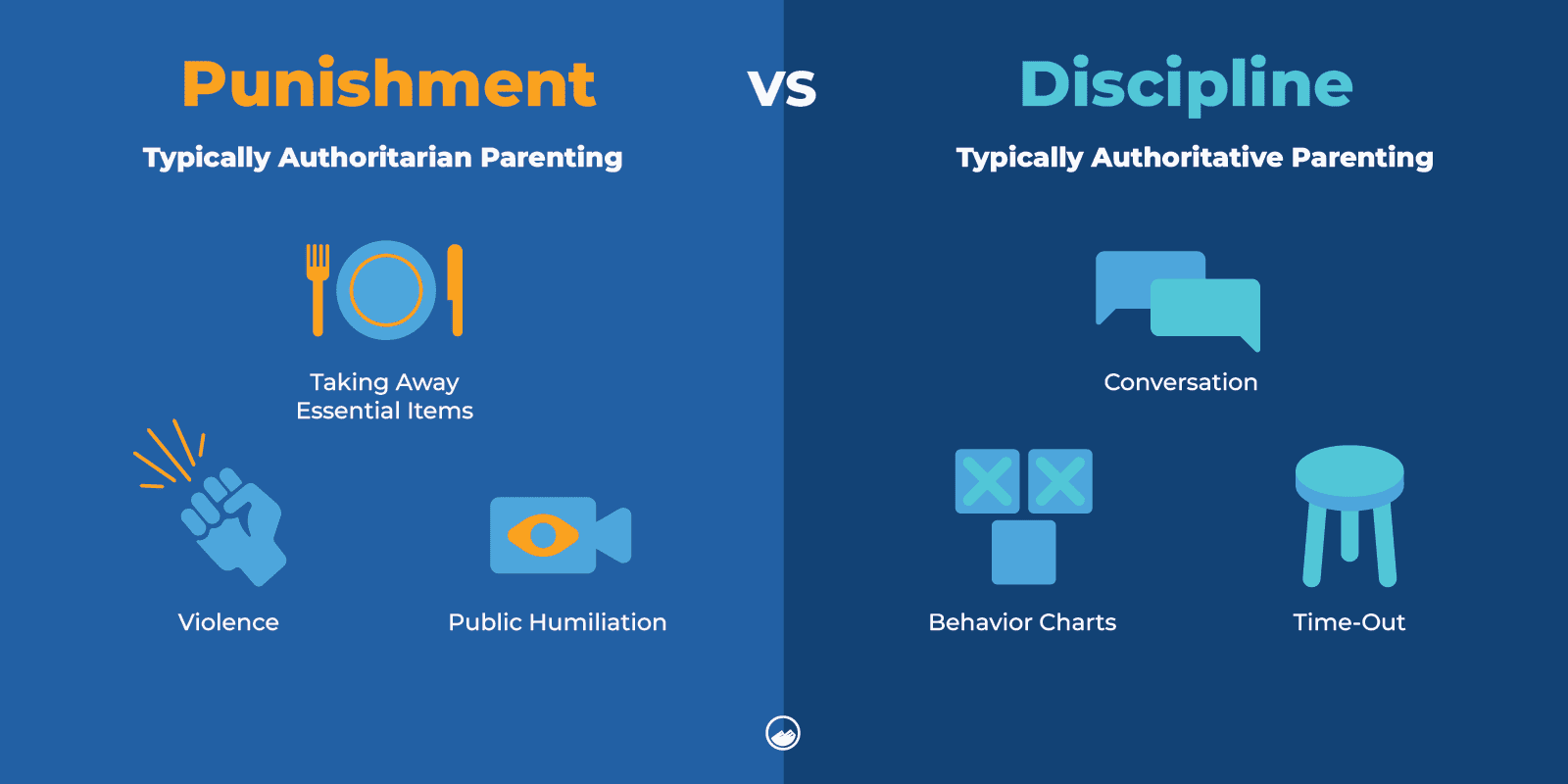
Permissive parents are usually warm and nurturing but have little or no expectations.
They don’t have many rules, which also results in little discipline, and usually, children with permissive parents are left to figure things out on their own.
Permissive parenting, often characterized by warmth and nurturance, stands in stark contrast to authoritarian parenting. While permissive parents certainly love and care for their children, their approach differs significantly in terms of setting expectations and enforcing rules.
Children of permissive parents may enjoy the freedom to explore and make choices independently, but this freedom can come at a cost.
In a permissive parenting environment, children often face a lack of clear boundaries and guidance. They may be left to navigate their world with minimal parental oversight, which can sometimes lead to confusion and uncertainty about appropriate behavior and decision-making.
Permissive parenting is also sometimes referred to as “indulgent parenting.”
Indulgent parents basically let children do what they want without any set boundaries. Permissive parenting can also be compared to “free-range parenting,” which can be similar in that it allows for more freedom and a “hands-off” approach. However, free-range parents may still have rules and limits in place, just more autonomy.
Common characteristics of permissive parenting can include:
Permissive parenting can develop bad habits such as eating habits, sleeping habits, or physical activity because of the lack of rules and structure.
Children of permissive parents may also be at higher risk for more health problems when they become adults.
When children with permissive parents grow into adults, they may have good social skills and self-esteem but may also be impulsive or lack self-regulation and self-control.
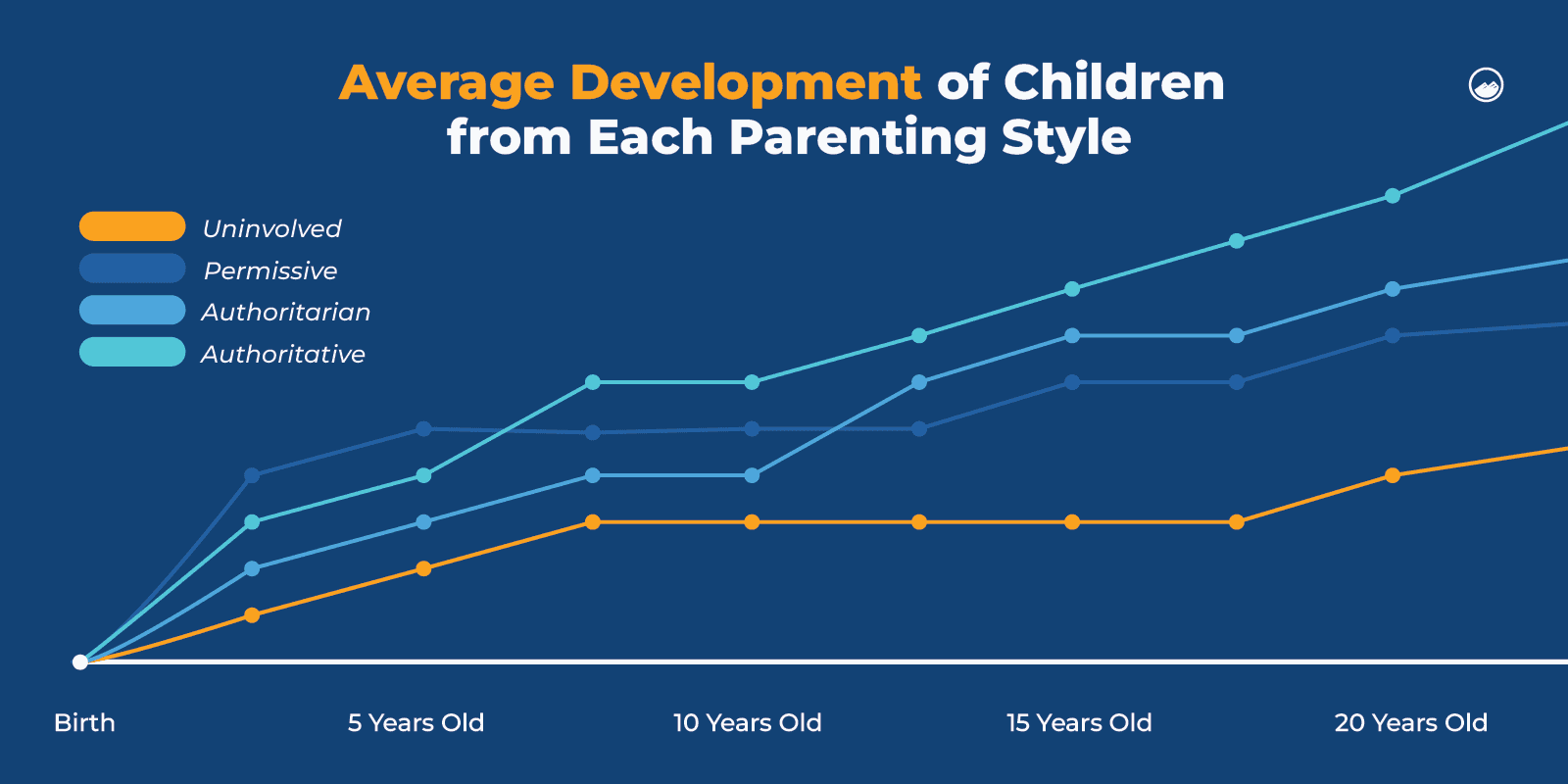
One of the strengths of permissive parenting is that it highlights freedom, which can promote creativity and confidence.
On the other hand, a weakness of permissive parenting is that it can lead to unhealthy habits or increase the risk of engaging in risky behaviors.
In neglectful parenting, also known as uninvolved parenting, the parent has limited communication with their child.
In the fourth style of parenting, parents also tend to offer little warmth and nurturing, lack responsiveness and have little or no expectations of their children.
Some of the most common characteristics of neglectful parenting include:
Signs of a neglectful parent can include:
A child who is emotionally neglected can face physical, social, and mental health challenges due to a lack of warmth and nurturing.
They can have difficulty regulating their emotions, face problems in school, and have difficulty building and maintaining relationships in the future.
Emotional neglect may be caused by various factors such as the parent’s history, trauma, age, mental health issues, or substance use.
With neglectful parenting, children are often very resilient, self-reliant, and self-sufficient.
However, they often develop these skills out of survival or necessity.
Some of the factors that can influence parenting styles can include:
The 4 C’s of parenting are:
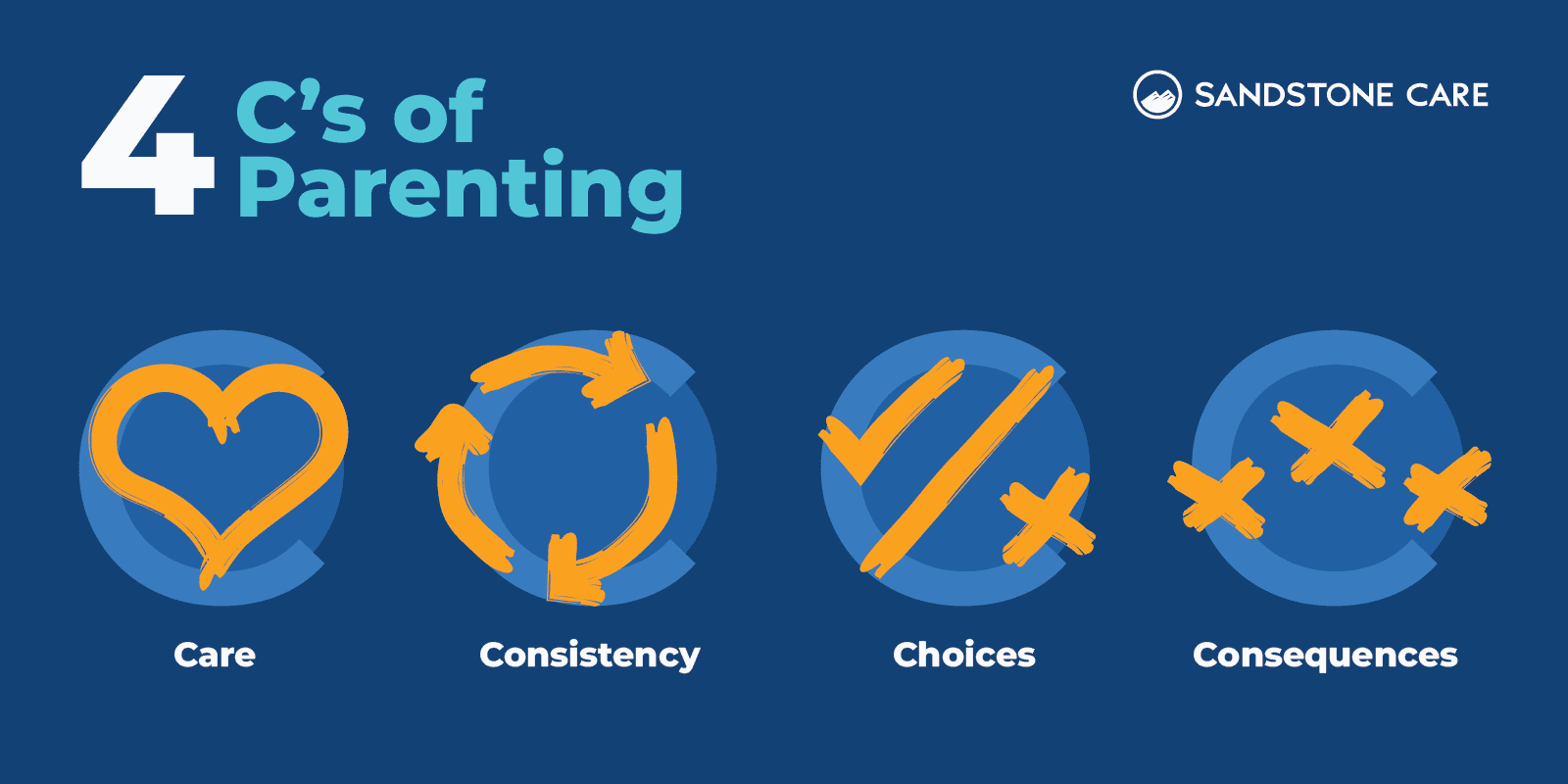
The 4 P’s of parenting are:
Parenting styles can influence the way a child feels, thinks, and behaves.
For example, children with authoritative parents may behave well because they have consistent rules and consistent discipline.
On the other hand, children with neglectful parents may have behavior problems or rebel because of the lack of rules and presence in their lives from their parents.

Authoritative parenting is considered to be the most effective parenting style in psychology.
Uninvolved or neglectful parenting is considered the most damaging for a child’s development due to the lack of consistency, warmth, nurturing, and support.
For example, a neglectful parenting style can contribute to a child developing hyper-independence as an adult.
When a child feels more secure and supported by their parent, such as in positive parenting styles like authoritative parenting, they tend to be more independent, more socially competent, and more confident.
These skills can impact a child’s growth, development, and intelligence.
Parenting styles can either promote or hinder a child’s development.
When a child feels secure and supported, they gain more confidence, independence, and skills needed to develop and grow.
When they lack that nurturing and warmth, it can impact how they feel and see themselves and the world around them and cause problems for their health, growth, and well-being.
Parenting styles can have a large impact on a child’s growth and development.
The habits they learn, along with the independence, social skills, and self-esteem a child gains from their parent’s styles, can impact their physical health, mental health, and relationships in the present and future.
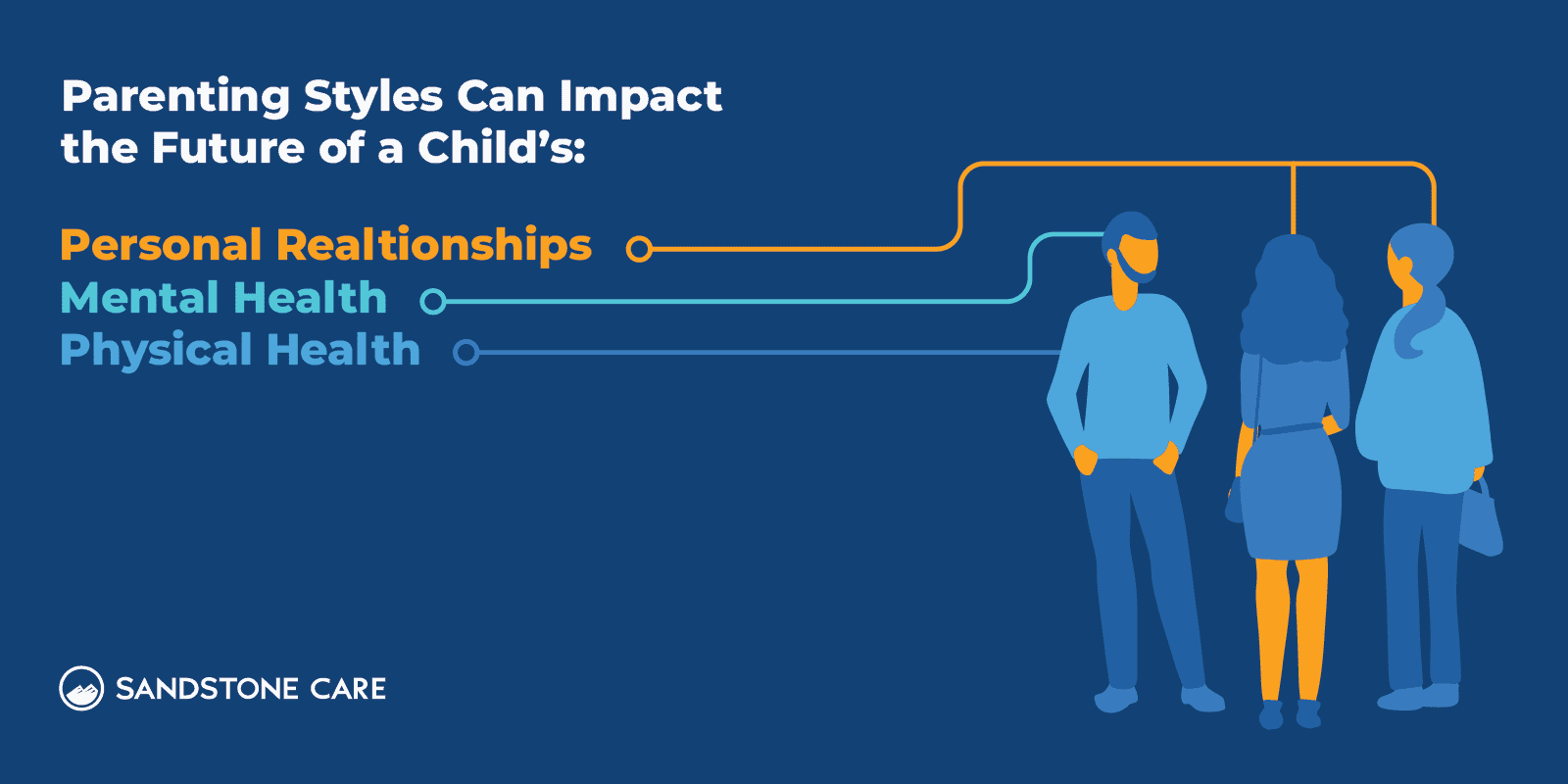
According to Social Science and Medicine, the “greatest impact of parenting on a child’s development occurs at adolescence, at a median age of 12 years”.
The most important influence on child development in early childhood and adolescence is nurturing relationships.
Some of the parental qualities that help promote healthy child development can include:
Children raised with negative parenting can face effects including:
All of these effects can play a role in a child’s development and the way they learn and grow. When a child has trouble regulating their emotions or problem-solving on their own, it can make it challenging to learn new skills or have the confidence to try new things.
FAQ
Our goal is to provide the most helpful information. Please reach out to us if you have any additional questions. We are here to help in any way we can.
Authoritative parenting style is most encouraged in modern America.
The causes of autism spectrum disorder are not fully understood.
However, autism is not caused by “bad parenting,” and there is no evidence that parenting styles cause autism. It is believed that genetics play a role in the development of autism in individuals and families.
It is important to note that parenting can be challenging, especially in families with children who have developmental disabilities. Carefully applying healthy parenting styles can help ensure that every child gets the support they need, preventing strained family relationships and glass children.
By learning the characteristics and features of each parenting style, you may be able to identify what your parenting style is.
Authoritative parents may reward children for following rules because they try to stay consistent in enforcing them and praising their children.
On the other hand, permissive parents may bribe their children with rewards to get them to follow rules or behave.
Uninvolved or neglectful parents are low in both demandingness and responsiveness.
While it may not always be the case, authoritarian parenting can become abusive verbally, physically, and emotionally.
Authoritarian parents often use punishment as a way to discipline their children.


Parenting styles refer to the attitudes and behavior of a parent toward their children. Positive parenting can help foster healthy growth and development. Sandstone Care supports teens and young adults with mental health and substance use disorders.